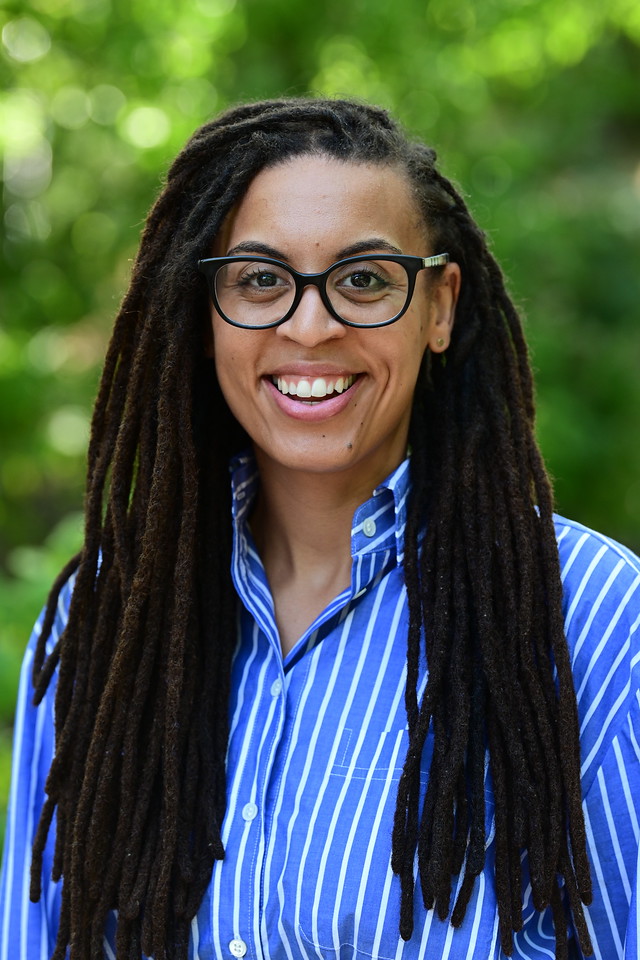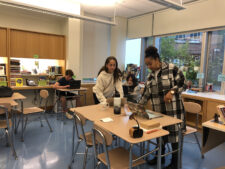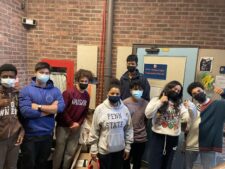The Ethical Culture Fieldston School has a long history of supporting students in both their academic success and their social emotional well-being. Over the past few years, the School has increased support among our Health, Wellness, and Counseling team and the Learning Center specialists. This year, ECFS has further prioritized our students’ well-being by creating a new all school senior administrative position — Director of Student Support and Wellness.
In July 2022, Mica McGriggs, PhD., started in the newly created role of Director of Student Support and Wellness. McGriggs is not new to ECFS — she began working at the School four years ago as the Diversity, Equity, and Inclusion (DEI) Coordinator in the Middle School after shifting her clinical practice to school-based work.

Joe Algrant, Head of School, and Kyle Wilkie-Glass, Associate Head of School, shared this about McGrigg’s appointment: “Mica’s education and experience as a psychologist and her current relationship with the School will serve her well in the creation of a visionary paradigm for student wellness in this newly created role overseeing the learning support and counseling/psychology functions at ECFS.”
Here, McGriggs reflects on her new role.
What are you looking forward to this year?
First and foremost, I can’t wait to learn more about and partner with my incredible team to continue best practices, and also look into any areas for growth. I’m really lucky — we have a large team that is leading student support work in a real hands-on way. I’m also eager to collaborate with different groups around campus to support our students. I want to learn what’s working really well with all of our student support services — including learning more about how we support students from both the academic and mental health and wellness perspectives.
What do you see as an opportunity this year?
There’s a real opportunity to do a temperature check and get a sense of the climate — we’re in a specific moment when we’re not out of the pandemic; but, we’re not in a state of emergency. We have a chance to gauge how students, families, and teachers are doing. Then we can build a lot of relevant programming once we have the data, which is exciting.
How have your experiences prepared you for this new role?
I’ve reflected on the fact that I’ve had many different experiences, without which I wouldn’t be able to do this job. I’m a therapist first in any job, and everything filters through a therapeutic lens. My set of clinical experiences has always come in handy. I’m a psychologist by training, which is needed for this role, but there have been other specific experiences that have lent themselves as well.
During my PhD program, I worked in the accessibility center at a university. The accessibility center is where all the learning accommodations were processed — I was charged with conducting the neuropsychological evaluations for all of the student athletes at a large Division I university. That experience lines up well with leading the Learning Center Department.
My previous role in the DEI Department acclimated me to the ECFS culture and people. It helped me see neurodiversity and mental health issues as areas of identity and equity. When I’m thinking about a student with learning challenges or a mental health diagnosis, I’m thinking about DEI work as much as I’m thinking about support, learning, and treatment. I’m also thinking about how learning and mental health challenges are marginalized and how we can recenter the conversation.
Finally, trauma has always been my area of study, and we’re coming out of a collective trauma from the pandemic as a society. That trauma-informed perspective has lent itself well to this role.
What do you think your biggest challenge will be in your new role?
It’s a Pre-K–12th Grade, all school role, so it will be challenging to look at things from a macro-level perspective, but that’s something I really like. We’re a big school — it’s easy to focus on one division, one developmental stage, or one set of challenges — so I will need to balance the through line and focus on the transition points in our School.
What do you think makes the ECFS community unique?
There’s a lot! I think the commitment to staying in hard conversations is very special. We have a lot of opinions, perspectives, and differences, but in my experience, everyone is willing to engage in conversation. The relationships between students and teachers are prominent here but not necessarily unique — but, it’s something we can harness. Pair that relationship with the ability to have difficult conversations and we can be really creative and flexible.
You’re looking in the mirror before the first day of school — how do you psych yourself up?
I usually have hype music playing for anything important, which makes me feel confident. Music with a good strong beat gets me in a space to take on a challenge. And I always try to wear something that makes me feel confident.



